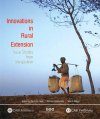About this book
During the past five years, the PETRRA (Poverty Elimination Through Rice Research Assistance) project has explored the development of innovative extension mechanisms through a learning-by-doing process with multiple service providers. Partnerships linked government, non-government and private sectors as appropriate. Topics addressed by the project include seed production and distribution systems, crop and soil fertility management, postharvest technologies, mobile pumps, aromatic rice and integrated rice-duck farming. The methods used include women-led group extension, whole family approach, participatory video, Going Public and picture songs. This book examines these approaches to extension and assesses their potential for replicability and scaling-up. It includes four thematic sections with people-centred case studies and a conclusion with practical applications of the transaction cost theory.
Contents
Part I: Introduction; New road map, P Van Mele; Part II: Gender; The right to learn: women want more agricultural advice, T Paris, International Rice Research Institute, Philippines, S Arifa Nabi, International Rice Research Institute, Bangladesh, A Salahuddin and N P Magor; Breaking down barriers: village women spread the word, H L Nessa, Geneticist, Bangladesh, and P Van Mele; Family approach in extension, H-A-Rashid, Agricultural Advisory Society, Bangladesh; Bringing science to life: video development for women-to-women extension, P Van Mele, A K M Zakaria, The Rural Development Academy, Bangladesh, R Nasrin and B Chakroborty, TMSS, Bangladesh, M Haque, RDA, Bangladesh, and J Rodgers, Countrywise Communication, UK; Part III: Learning with rural communities; Creative learning methods, J W Bentley, Consultant, Bolivia, and P Van Mele; Watch and learn: video education for appropriate technology, P Van Mele, A K M Zakaria and J W Bentley; Village soil fertility maps, M Abu Saleque, Bangladesh Rice Research Institute, H-A-Rashid, P Van Mele, and J W Bentley; Going public: a quick way to interact with communities, P Nash, CABI Bioscience, UK, and P Van Mele; Picture songs, J W Bentley, M Nuruzzaman and Q W Nawaz, Shushilan, Bangladesh, and R Haque; Part IV: Enterprise webs; The enterprise web, N P Magor; Integrated rice-duck: a new farming system for Bangladesh, M A Khan, Friends in Village Development, Bangladesh, G J U Ahmed, Bangladesh Rice Research Institute, N P Magor and A Salahuddin; Pump it up: developing a pro-poor mobile pump market, B Alam, International Development Enterprises, Bangladesh, N P Magor and P Van Mele; Adding flavour: a value chain approach for aromatic rice, M Hassanullah, Agricultural Marketing Specialist, Bangladesh, A Salam, APEX, Bangladesh, S Ahmed, Consultant, Bangladesh, and N P Magor; Part V: Pro-poor seed systems; Innovations in seed systems, S Danielsen, Danida, Nicaragua, K Bashar, Bangladesh Rice Research Institute, and M Holderness, CABI Bioscience, UK; More is more: validating rice varieties with NGOs and poor farmers, M Husain, Bangladesh Rice Research Institute; Building a rice seed network, K Bashar, A Salahuddin and P Van Mele; Farmseed: putting farmers at the heart of the seed system, P Van Mele; Grameen seed: Grameen experiments with a pro-poor seed business, P Van Mele, A Salahuddin, and A Jabbar, Grameen Krishi Foundation, Bangladesh; Innovating with federations: community institutions take the lead in seed marketing, S Samsuzzaman, RDRS, Bangladesh, and P Van Mele; Part VI: Synthesis; People and pro-poor innovation systems, P Van Mele, A Salahuddin and N P Magor
Customer Reviews
Biography
Edited by P Van Mele, CABI Bioscience, Egham, UK; A Salahuddin, International Rice Research Institute, Bangladesh; N P Magor, International Rice Research Institute, Bangladesh































